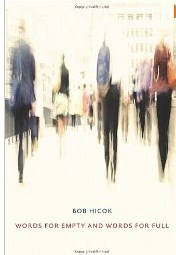
Poetry is too often a decorative vase which holds nothing, shapely words wrapped around spaces. Bob Hicok’s latest works, collected in Words for Empty and Words for Full, avoid meandering wordiness and lay forth solid, heavy stanzas, elegant words with weight and intent. Hicok’s poetry is sensitive, yes, but not fragile; these are strong, substantial works.
The best way to discuss Words for Empty and Words for Full is to take the collection as a whole and consider Hicok’s work en masse. The topics within are touchy, sensitive and difficult. There is no shying away from abortion, climate change, war or the Virginia Tech shootings, which the author experienced first-hand. Likewise, there is no preachy ranting, no self-aggrandizement, and no pointed rules to the “right” way. The poems keep these issues on a manageable, human level, wherein Hicok relays personal accounts and those of nameless friends. The result is a highly personal, relatable collection of works that make readers think.
Hicok also possesses the gift of perspective, the ability to tie seemingly unrelated thoughts to one another, pull clouds (“dirty white bushes”) into his wife’s breath, ephemeral half-ideas into looming questions about humanity. These poems can bring unexpected laughter or sadness, but their sole purpose is to make readers considerate of life--thoughtful of one another, the individual’s place within the world.
An associate professor of English at Virginia Tech University, Hicok mentions the shootings that took place in Norris Hall several times in this collection. “So I know” reveals his retrospective guilt for not mentioning that Cho wrote about murder in his English assignments. In “Mute,” we discover that the killer never spoke in class--the recordings provided by investigators were the first and only words ever heard by most of the staff and classmates. Other works reflect on life after tragedy, how a community and this man decide to continue going, falter, and try to begin again. The senselessness of violence plagues Hicok and his work.
“Life”, the piece from which the collection takes its title, is about one man’s attempt to understand and participate in the issues that affect a world and a person. Climate change looms large, and everything from gardening to bargaining with the sun seems like a viable option for saving the planet.
“Rates of currency exchange, thermal exchange,
chromosomal exchange. I begin
to fill up, as if I’m a glass
and the world is water, is rain.”
“Watchful,” a poem that begins with the removal of a wasp’s nest, explores the author’s relationship to war—that is, its absence from his life:
I know no soldiers. I know no one who knows
a soldier. So this is a war on tv, a program, a dream,
The Odyssey, The Green Berets, Platoon. Proximity is required
to feel, understand.
In “Basic physics” Hicok explores the human impact on nature.
“Like I said: lately
I’ve been drinking. To you, western lowland gorillas
of the Republic of Congo. You need our help
to survive only because we exist. Irony
is without nutritional value.”
Hicok’s strength lies in his ability to write without pretention and excess; his words are those of everyday speech, his thoughts those of everyday men and women. No syllables are wasted on frills or lyrical showing-off. I found myself blasting through the pages then turning back around to reread and dissect, to question intent and word choice, to decide what lines meant to me and to the author, how they might differ for my sister, my friends. The reading of Words for Empty and Words for Full is a searching, questioning experience. The person who picks up the book is not the same as the one who puts it back down—sure, they look alike and have the same clothes on, but something intrinsic changes.

